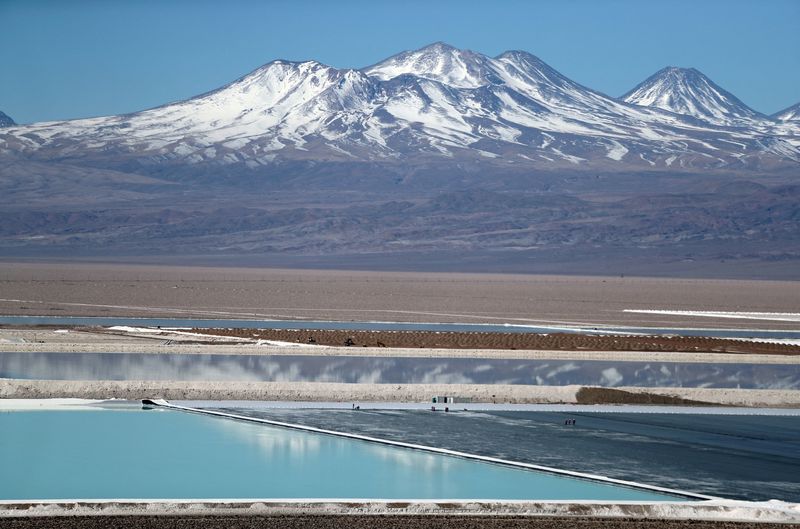Analysis: Chile’s lithium takeover plan faces technical, political challenges
2023.04.27 23:30

© Reuters. FILE PHOTO: A view of a brine pool of a lithium mine on the Atacama salt flat in the Atacama desert, Chile, August 16, 2018. REUTERS/Ivan Alvarado/File Photo
2/3
By Fabian Cambero
SANTIAGO (Reuters) – While Chile’s plan to take control of its lithium industry has caused global shockwaves, state-led production of the metal used to make electric vehicle batteries is seen by analysts as likely years away given technical and political challenges.
President Gabriel Boric last week said he would move to gradually nationalize the country’s lithium industry, which holds the world’s largest reserves of the metal, in a bid to boost Chile’s economy.
The plan relies on negotiations with lithium producers, public-private partnerships with technology companies, tense negotiations with political rivals, and the creation of a national lithium company, all of which could take years to accomplish, analysts said.
Chile’s divided Congress, for example, has already stonewalled much of Boric’s progressive agenda, and the government would need support from opposition parties.
“We need projects to be developed as soon as possible if we want Chile to benefit from this (lithium) boom,” said Daniela Desormeaux, director of Chile’s Center for Copper Studies (Cesco), adding that creating the national lithium company is “the most complicated” element of the plan since it requires legislative support.
Economy Minister Nicolas Grau told Reuters earlier in the week that the government wanted to start negotiations with current producers by mid-year and have an agreement before the end of Boric’s term in 2026.
Full cooperation from existing lithium producers Albemarle (NYSE:) Corp and SQM is unlikely, with Albemarle already signaling it will keep its contract unchanged until it expires 2043.
“The contract itself is not going to change,” Albemarle’s Chile Manager Ignacio Mehech told reporters after a meeting with Corfo, Chile’s state development office that it currently holds its lithium contract with.
“State participation, according to what Corfo told us, will be discussed later when the contract is about to expire and therefore from now until 2043 our counterpart will continue to be Corfo.”
SQM on Wednesday signaled that it was ready to start talks with the government soon.
Furthermore, new requirements for unproven extraction techniques and long environmental regulatory review times could “act as a brake on the development of lithium projects at a time when the lithium ‘moment’ is widely seen as right now,” said Nicholas Watson, from consultancy Teneo.
“Even if the entity is authorized, it will take time to establish it as a fully resourced and viable outfit that can partner effectively with private firms,” said Watson, referring to a state lithium company.
CODELCO’S ROLE
Chile’s state-run Codelco, the largest producer in the world, plays a key role in Boric’s lithium plan although it has no experience in producing the white metal.
Despite some concerns that lithium production could distract Codelco from its core copper focus, Grau said the government has “faith in Codelco’s abilities.” He did not rule out Codelco being the operator in future public-private partnerships.
Getting a cohesive plan together soon matters could become more political as the country faces presidential elections in two years.
“If negotiations drag out, the 2025 electoral cycle will begin to play a larger role as some candidates could offer a different vision for the country’s lithium,” according to a report from the Eurasia consultancy.
(Graphic: Lithium reserves –
WAIT AND SEE
Chile was the world’s largest lithium producer until Australia overtook it in 2017. A JPMorgan (NYSE:) report noted that Argentina’s burgeoning lithium industry, which has tended to embrace private producers, could overtake Chile in 2028.
“For now, it remains uncertain whether Chile will be able to organize its lithium industry towards considerable growth in terms of production and industry value,” said Johann Tan, a commodities analyst at Fitch Solutions.
Despite Chile’s leading role in global lithium production, “the effort to assert state control over strategic projects” could enhance the role of Australia and Argentina “which have demonstrated greater regulatory certainty and fewer risks of resource nationalism,” the Eurasia report read.
The report noted that Argentina currently has more lithium projects in the pipeline than any other country in the world.
SQM and Albemarle, the only two companies that currently extract lithium in Chile, both held preliminary meetings with the country’s state development office this week to discuss the government’s plan.
SQM said it would need an additional $2 billion to meet its environmental sustainability goals, which it said also align with the government’s lithium strategy. Albemarle has said it needs new water sources to expand in Chile’s Atacama salt flat, noting a desalination project was awaiting permits and construction.
The government is seeking a controlling stake in all public-private partnerships in the Atacama salt flat, but when asked if private companies will be in charge of decision making or if the state will have the final say, the economy minister said it would depend on negotiations.
“In the Atacama salt flat, the answers to those questions will be answered little by little as negotiations progress,” Grau said.
Outside the Atacama, the government said it would take a controlling stake in “strategic” salt flats, but has yet to define that also.
When asked which salt flats are strategic, Grau said “there still isn’t enough information, but of course that will exist when private companies participate.”
Several companies have already begun exploration in Chile’s Maricunga salt flat south of the Atacama. Grau added that “it’s reasonable to leave space” for how the specifics of each public-private partnership will work depending on the value of each project.
“Maybe Albemarle or SQM can negotiate a shareholders agreement that could work,” said Juan Carlos Guajardo, head of Plusmining consulting in Santiago, but added he finds it hard to imagine that smaller companies would want to provide capital for projects on which the state makes the final decisions.
(Graphic: Chile’s massive lithium deposits key to future of EVs –








